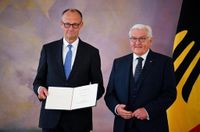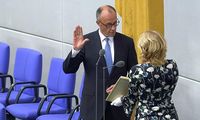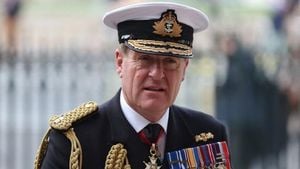In a dramatic turn of events, Friedrich Merz was officially elected as the new Chancellor of Germany on May 6, 2025, after a tumultuous first round of voting that saw him fall short of the required majority. This unprecedented situation marked the first time in German history that a designated chancellor failed to secure election on the first ballot following a federal election and coalition negotiations.
Initially, Merz, the leader of the Christian Democratic Union (CDU), garnered only 310 votes, six votes shy of the absolute majority needed in the Bundestag, which consists of 630 members. This setback was attributed to the surprising defection of 18 members from his coalition, leading to speculation about internal dissent within the CDU and potential strategic maneuvering aimed at extracting concessions from the party.
Following this unexpected outcome, the Bundestag reconvened later that day, with all parliamentary groups except the far-right Alternative for Germany (AfD) agreeing to proceed with a second round of voting. At 3:15 PM, the second vote took place, and Merz secured 325 votes in favor, successfully surpassing the required threshold of 316 votes. He was then officially appointed by President Frank-Walter Steinmeier at Bellevue Castle, where he took his oath of office.
Merz's election is not just a personal victory; it reflects a complex political landscape marked by shifting allegiances and significant compromises. In order to secure the necessary votes in the second round, Merz had to rely heavily on the support of the Social Democratic Party (SPD), a partnership that has raised eyebrows given the ideological differences between the two parties. Reports indicate that this alliance came at a steep price, including a concession to abandon a promised crackdown on migration and a commitment to a joint ban on the AfD.
Political analysts have noted that while Merz's ascent to the chancellorship is a significant milestone, it has also exposed the fragility of his position. The initial rejection in the first round of voting is seen as a warning signal, suggesting that his government may struggle to maintain cohesion amidst rising pressures from various factions within the Bundestag. Alice Weidel, co-leader of the AfD, characterized the first vote's outcome as a "good day for Germany," calling for early elections and emphasizing the instability of Merz's government.
The political climate in Germany is further complicated by pressing issues such as high inflation, soaring energy prices, and a stagnant economy. Many citizens have expressed skepticism regarding Merz's ability to deliver on his campaign promises, which included plans for social reform, economic recovery, and a more stringent immigration policy. According to the latest Politbarometer from ZDF, a majority of 56 percent of Germans oppose Merz's appointment, reflecting a growing discontent with the current political direction.
In his first address as Chancellor, Merz acknowledged the challenges ahead, stating, "It was an honest day, ultimately a good day. It teaches us all that we must live up to our great responsibility. We will make a better Germany possible." His remarks were met with mixed reactions, as many observers remain cautious about the durability of his coalition and the implications of his compromises.
Merz's government is composed of 17 ministers, including seven from the CDU, three from the Christian Social Union (CSU), and seven from the SPD. Key appointments include Lars Klingbeil from the SPD as Minister of Finance and Vice Chancellor, Johann Wadephul from the CDU as Minister of Foreign Affairs, and Katherina Reiche from the CDU as Minister of Economy. These selections indicate a strategic balancing act, as Merz attempts to navigate the ideological divides within his coalition while addressing the expectations of the electorate.
Despite the challenges ahead, Merz's election has been met with congratulations from various international leaders. Ukrainian President Volodymyr Zelensky expressed hope for a stronger German leadership in Europe under Merz's guidance, while Italian Prime Minister Giorgia Meloni emphasized the importance of collaboration between Italy and Germany to tackle shared challenges. French President Emmanuel Macron also extended his congratulations, highlighting the need for a robust Franco-German partnership moving forward.
As Merz embarks on his chancellorship, the stakes are high. He faces a delicate balancing act, needing to satisfy both his coalition partners and a restless electorate. The road ahead is fraught with potential pitfalls, and any misstep could further embolden the AfD, which has seen a surge in support amidst the political turmoil. With the specter of early elections looming and the pressure to deliver tangible results mounting, Merz's ability to govern effectively will be put to the test in the coming months.
In summary, Friedrich Merz's election as Chancellor of Germany marks a pivotal moment in the nation's political landscape. While he has managed to secure the chancellorship after a rocky start, the underlying tensions within his coalition and the pressing societal challenges pose significant hurdles. As the new government takes shape, all eyes will be on Merz to see how he navigates the complexities of German politics and whether he can fulfill the promises made during his campaign.





